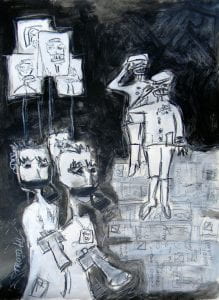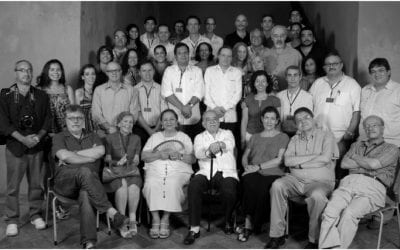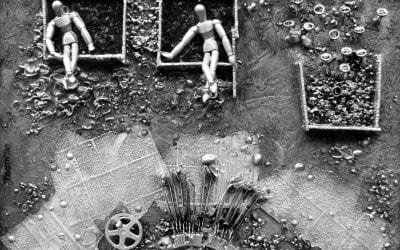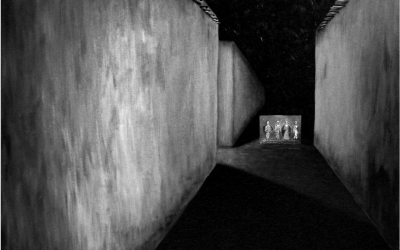The Law as Censor
Freedom of Press in Ecuador
I was headed somewhere in a taxi with my 10-year-old daughter Sasha. It was a Saturday afternoon in September 2009, and we had just returned to Quito after a year at Harvard with a Nieman Fellowship. The taxi driver was listening to a speech by Ecuadoran President Rafael Correa. He didn’t have much choice of programming—most radio stations were in the so-called enlace, universal broadcasting.
Correa’s two-hour radio address about his weekly accomplishments was rebroadcast on all the public media and most radio stations. Sasha and I got into the taxi precisely at the moment when the segment “Freedom of Expression” was starting. Correa began to insult Diario El Universo, the daily ‘on the record’ of Ecuador and where I have worked for the past 13 years. “Corrupt, mediocre, and unpatriotic, ” were some of the adjectives the president used that day. For most Ecuadorans this was nothing of the ordinary. For the last three years, the president had been engaging in these kinds of attacks against journalists.
But my daughter, who was listening to these broadcasts for the first time, got scared. She started to barrage me with questions. What was happening? Why was the president calling her mommy “corrupt”? Thankfully, we arrived at our destination. I waited until Sasha and I were alone to explain that the insults were just talk and not important at all. I tried to explain to her how things had changed in Ecuador in the year that we lived in Cambridge.
In times of “Revolución Ciudadana,”—the so-called citizens’ revolution—journalists have become a primary target for insults from President Correa, who considers the media he does not control as his primary political opposition.
But now, the situation has become more serious than insults and four judicial processes against a newspaper and three media workers. A Communications Law, which would seriously restrict press freedom, is under consideration by the parliament. And because this bill is taking too long to be approved, Correa wants the people to approve a regulatory council to restrict freedom of speech.
The disagreement between President Correa and journalists (and their media) rests in this University of Illinois economist’s incapacity to understand that we journalists carry out the role of watchdogs and hold the powers-that-be accountable to their citizens.
Convinced that he is the anointed person designated to carry out one of the most radical transformations of Ecuador, in great part due to the high prices for oil and his great capacity for work, as well as his intelligence, Correa does not tolerate criticism.
He would prefer to have the media as an echo chamber that praises his accomplishments, that is, publishes pure propaganda. Or one that publishes the corrupt practices of everybody else but his officials or his party’s allies.
Ecuador presents a panorama in which the credibility of political parties is around 26%; opposition parties are still trying to find a way to renew themselves (or at least to cover their backs) to wage a struggle against a leader who has more than 65% popular support after four years in power. In effect, journalists provide some of the few voices critical of the government. Columnists are often more inclined towards the opposition.
The government blames journalists for everything bad that has happened in the country like the bank crisis of 1999 and lately the rise of crime. It is a stigmatization that creates an inhospitable environment in which to work, especially since—just as in any other profession—we can make mistakes.
Attacks can arise even from little mistakes—like an error or a perceived error in a headline. Sometimes I’ve even had to explain to someone I’ve just met that a mistake in a headline should not be considered on the same level of “abuse” as stealing public funds because there is a big difference between being a journalist and being a state official.
In this smear campaign against journalists and media that also includes mandatory interruptions of journalistic programs on television to broadcast messages against their hosts, two media workers have been accused of terrorism. A word that is becoming very convenient to the government and the judges who inspired themselves in Correa’s words.
The first is Juan Alcívar, from La Hora newspaper, accused of throwing a tear gas bomb during Correa’s visit to La Concordia. The second is the Shuar Indian José Acacho, from the communitarian radio La Voz de Arutam (Voice of Arutam), who is also a leader of the Shuar Federation. This radio broadcasted an uprising against the government on September 30, 2009, in the Amazonia.
Needless to say the government also denies information and refuses to grant interview requests to certain media. And just in 2010, the state denied the renovation of broadcast licenses for two radios. In addition, Correa has created a propaganda machine for the achievements of the government. On the one hand, Correa maintains or controls a group of public media (19, including six state-run and another 13 confiscated from bank stockholders—the latter which were supposed to be sold two years ago).
And on the other, official advertising in the media has exploded in the last four years to count for more than US$190 million between 2007 and 2010. This number is around 0.31% of our Gross Domestic Product—or a little bit less that the 2011 budget of the Ministry of Agriculture.
This amount does not take into account the production of these commercials, the billboards, communications advising and information fairs. Just during the World Cup, the government spent $900,000 in transmissions accusing the media of robbery, lies and even murder.
As one can suppose, official advertising is sometimes used to reward some type of ‘loyalties’.
The new Constitution gave another weapon to the government, a dangerous one. It is mandatory for the Congress to approve a Communications Law and the country has been discussing a number of singular norms about the press.
The key points of the bill? To create a “communication council” controlled by the government that could shut down media and forbid people without a university degree in Social Communication to work in the media.
In spite of all the officialist lobbying, even the majority party in parliament, Alianza PAIS, has shown itself reluctant to sign a blank check and just approve the proposed Communications Law that the executive branch wants. Even the Inter-American Commission of Human Rights has asked the Assembly not to restrict the freedom of speech in Ecuador.
As a way to ‘get it done,’ President Correa included two proposals related to the media in a referendum to “amend” the Constitution, which is only 28 months old and which was drawn up by the officialist majority. In fact, he proposes to change the Constitution although the executive power cannot legally do this without a Constitutional Assembly.
These proposed changes include a new regulation through which private communications firms (not just the media), their directors and principal stockholders could not hold any shares in companies outside the communications field.
And the second would create a regulatory council that would establish content norms for the printed and broadcast media but would also establish criteria for subsequent imposition of liability.
In other words, a simple council (some nine or eleven people) will have the power not only to control media content but to judge journalists.
In this manner, “the citizens’ revolution” appeals to the supreme will of the people to tighten the screws to limit freedoms for all Ecuadorans. If this rule is approved, the result will be self-imposed censorship.
And where are the journalists in the middle of all this? We are still playing in a democratic field; Ecuador doesn’t have a tradition of persecuted or disappeared journalists. But this is a difficult moment for those who feel a passion for journalism. We have the challenge to do our best to keep our audiences informed and not to let our personal feelings be expressed in our stories. Maybe I’m naive but I still believe that we have our words and our stories to counteract this campaign.
We have to get our voices heard outside the country to explain that Ecuador is not Venezuela—but freedom of speech is in danger here. We need to have the courage to practice our profession with honesty and accuracy.
And, most important of all, we have to feel the dignity of our profession. Last Sunday, my husband told a friend, who used to work for this government, “I’m proudly married to a ‘corrupt’ journalist.” And whether the government calls me—and all watchdog journalists—”corrupt,” I’m proud to be a journalist, defending citizens’ rights in Ecuador.
Spring 2013, Volume XII, Number 3
Mónica Almeida is the Quito editor of Guayaquil-headquartered El Universo. She was a 2009 Nieman Fellow at Harvard.
Related Articles
New Journalists for a New World
I received a surprising phone call one day in late 1993, when I was the director of Telecaribe, a public television channel in Barranquilla, Colombia. The caller was none other than Gabriel García Márquez. “Will you invite me to dinner?” he asked me. “Of course, Gabito,” I…
Latin American Nieman Fellows
A few days after I arrived at Harvard in August 2000 to begin my work as curator of the Nieman Foundation for Journalism, Tim Golden, an investigative reporter for the New York Times in Latin America, phoned me. “Could I find a place in the new Nieman class for a Colombian…
Freedom of Expression in Latin America
In June 1997, Chile’s Supreme Court upheld a ban on the film “The Last Temptation of Christ,” based on a Pinochet-era provision of the country’s constitution. Four years later, the Inter-American Court of Human Rights heard a challenge to this ban and issued a very different…





